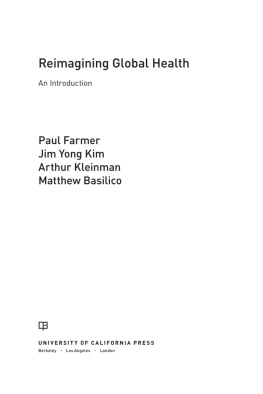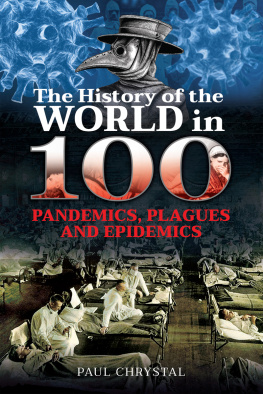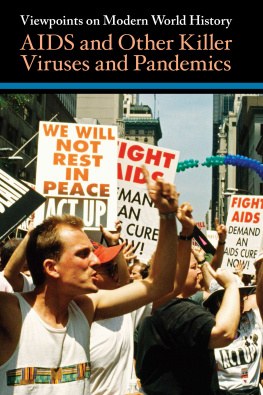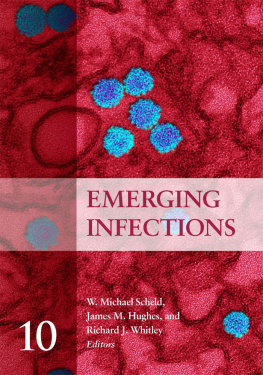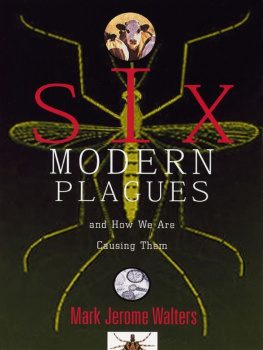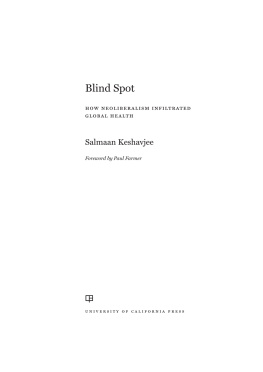ADDITIONAL PRAISE FOR
Infections and Inequalities
A strangely uplifting read.... One starts this book with a sense of helplessness... reading on, though, Farmers lived example gradually engenders hope. As a founder member of the non-governmental organisation Partners in Health he is, through direct action and a genuinely humble altruism, making a difference. His work is burnished by a heartening morality and a demonstration of high ideals made reality. There is a painful awareness that these are drops in an ocean, but rather than overwhelm, the result is to inspire.
The Guardian (London)
In Infections and Inequalities, Paul Farmer, who was trained in both infectious diseases and anthropology, uses these disciplines and his medical experience in Haiti to provide a trenchant analysis of the biologic and social realities of chronic infectious disease.
New England Journal of Medicine
Farmers meticulous description of the stories of some patients, and of the circumstances in which they live, reminds us of the enormous suffering of a large part of humanity that has practically no access to the most basic medical care. Even today, entire family groups unacceptably succumb to tuberculosis, the worlds leading infectious cause of death, despite the fact that effective treatment has been available for many decades.
British Medical Journal
Farmers ability to integrate poignant case studies with epidemiological data and structural analysis are very effective in highlighting the barriers to appropriate careeither primary or tertiary careand countering the shibboleths about infectious disease being a result of poor compliance.
Social Science and Medicine
In every speech and in all his books, Farmer is at pains to assert the interconnectedness of the rich and poor parts of the world.... Most modern descriptions of human behavior give selfishness great explanatory power, even over what look like selfless acts. But after Id spent a month with Farmer altruism had begun to seem plausible, even normal.
Tracy Kidder, The New Yorker
Bolstered by thorough knowledge of the countries in which he practiced, relevant and cogent case histories, and a caring but disciplined attitude, Farmer powerfully argues for substantial changes in epidemiological theory and practice. He raises thought-provoking and necessary questions, and he provides answers that, if often unsettling, are pertinent and capable of being put to use by individuals and governments truly interested in solving, not sidestepping, life-threatening situations.
William Beatty, Booklist
In his moving and angry book [Farmer] gives a real-time account of contemporary plaguesAIDS and tuberculosis in Haiti and Peru. It is a truly fin de sicle story of unfinished business with an old plague, the fight against a new one, and immoralityimmorality because effective remedies are there but are being unreasonably and unfairly denied. Technical incompetents, stiff-necked bureaucrats, hard-hearted capitalists, altruistic priests and starving peasants are all there as well. The only things that distinguish Farmers account from a Dostoevskian novel is a meed of hard, effective science and a depressingly familiar story of the powerfully malignant effects of racism.... It is hard to think of more compelling examples to underpin his arguments. It makes the book and its message accessible to the general reader and forcefully reminds doctors, nurses, scientists, sociologists, economists and aid workers of their unfinished business.... But the main lessons he draws are for us all. We must do all we can to diminish social inequality.
Hugh Pennington, The Times Higher Education Supplement
Farmers work diverges strikingly from the current emerging infectious disease literature, much of which misses essential points about causation that Farmer brings out very well.... It is sure to appeal to those general readers attracted to books like Garretts The Coming Plague, as well as to readers in medicine, public health, and the sociomedical sciences.
Frederick L. Dunn, M.D.
Farmer argues against those who would insist that the health problems of the poor require and must await structural changes, that underdevelopment negates the efforts of physicians. He believes there is much that doctors can do, not simply as activists but as physicians.
Randall Packard, author of White Plague, Black Labor
The physician Paul Farmer has written a lucid, solid, well-documented book that shows that the epidemiological demon is a social demon.... It is no longer adequate to make this case to the rich or for the advocates of the least well off to address the rich on their behalf. It would presage far better things for the improvement of international public health if the poor were to call on Paul Farmer to become the lynchpin of a new Tricontinental movement.... Called by a priest to work among peasant farmers, as the densest chapter of his book explains, this physician has genuinely listened to the poor, and he expresses the collective thinking of a people confronting AIDS. This book is a call to action.
Le Monde Diplomatique
Infections and Inequalities
Infections and
Inequalities
THE MODERN PLAGUES
PAUL FARMER

has been adapted from earlier work by the author, which appeared in the following publications: Social Inequalities and Emerging Infectious Diseases, Emerging Infectious Diseases 2, no. 4 (1996): 25969; Women, Poverty, and AIDSAn Introduction, in Women, Poverty, and AIDS: Sex, Drugs, and Structural Violence, edited by P. E. Farmer, M. Connors, and J. Simmons (Monroe, Maine: Common Courage Press, 1996); The Exotic and the Mundane: Human Immunodeficiency Virus in Haiti, Human Nature 1, no. 4 (1990): 41546; Sending Sickness: Sorcery, Politics, and Changing Concepts of AIDS in Rural Haiti, Medical Anthropology Quarterly 4, no. 1 (1990): 627; and Social Scientists and the New Tuberculosis, Social Science and Medicine 44, no. 3 (1997): 34758.
University of California Press
Berkeley and Los Angeles, California
University of California Press, Ltd.
London, England
First paperback printing 2001
1999 by
The Regents of the University of California
Library of Congress Cataloging-in-Publication Data
Farmer, Paul, 1959.
Infections and inequalities : the modern plagues / Paul Farmer.
p. cm.
Includes bibliographic references (p. ) and index.
ISBN 978-0-520-22913-6 (pbk. : alk. paper)
1. PoorHealth and hygiene. 2. Socially handicappedHealth and hygiene. 3. Communicable diseasesSocial aspects. I. Title.
RA418.5.P6F37 1998
306.461DC21
98-23807
Printed in the United States of America
14 13 12 11 10 09 08 07 06
15 14 13 12 11 10 9 8 7
The paper used in this publication meets the minimum requirements of ANSI/NISO
Z39.48-1992 (R 1997) (Permanence of Paper). 
For Haun Saussy,
in celebration of two decades of friendship
The loss of equality was succeeded by the most
appalling disorder.... It was at last impossible
for men not to devote some thought to this awful
situation and the calamities that had befallen them.
JEAN-JACQUES ROUSSEAU, 1755
The health effects of inequality have shown us
how deeply people are affected by these structural
features of our society. But even more important
Next page


